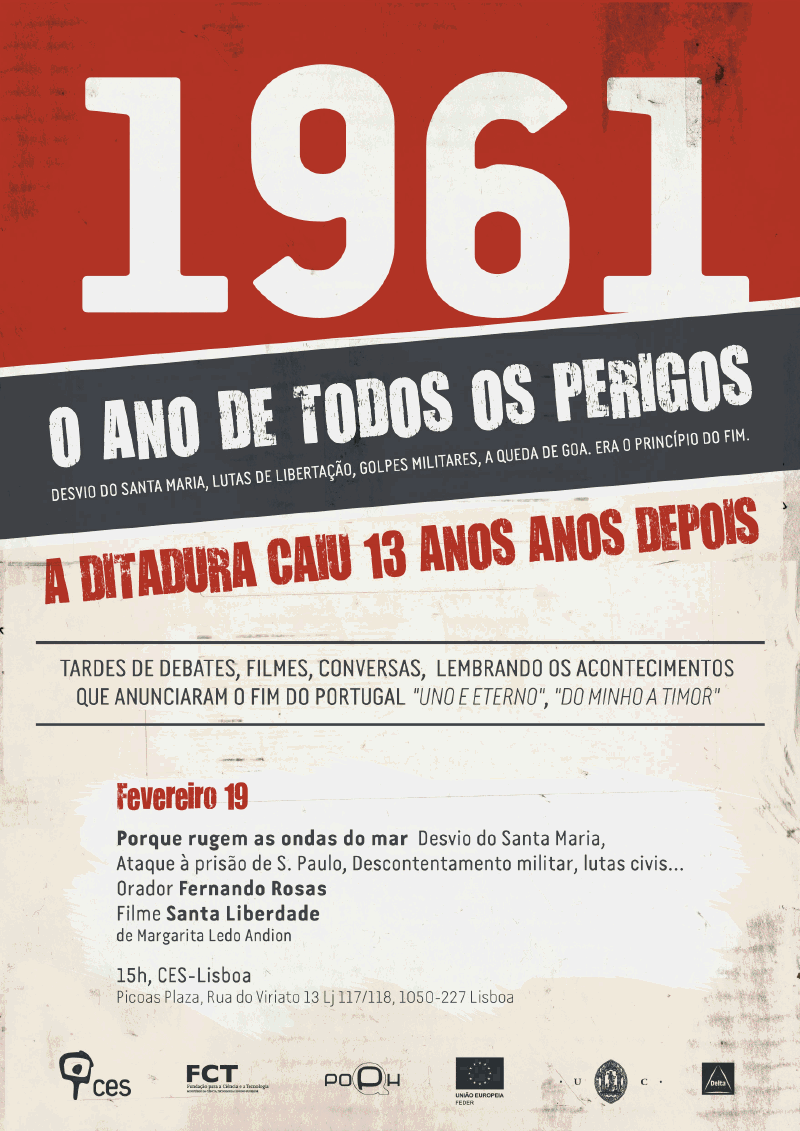Lecture
The roar of the waves: The hijack of Santa Maria. The attack to S. Paulo prison. Military discontent. Civil struggles.
Fernando Rosas (Historiador)
February 19, 2011, 15h00
Picoas Plaza, R.Tomás Ribeiro, 65, CES-Lisbon
Framework
Cycle 1961: the year of all dangers

The year of 1961 was, for the Salazar regime, a year of all dangers, and it became the dictator's annus horribilis. In different contexts, several events marked that year, announcing the end of the Portuguese colonial-fascist regime. As one the the CES thematic guidelines focus on deepening the knowledge on the Portuguese-speaking space - and its historical connections - this set of sessions aims at exploring a space which is united by several histories and struggles.
2011 marks the 50th anniversary of that year of all dangers. This is a good occasion to remember facts, often forgotten, listening to their actors, framing them in the common history that unites Portugal and the countries in which its colonial possessions were transformed - or integrated.
Right in the beginning of January, 1961, Angola faces the uprising of Cotonang workers, protesting against the work conditions imposed by the cotton production company. The demonstrations are rapidly repressed by the Portuguese army, but they do announce the beginning of the guerrilla war for the Angolan independence, marked by the attack to S.Paulo prison, in Luanda, on February 4th, and by the armed uprising - which Mário Pinho de Andrade would classify as a "jacquerie" - led by the UPA (Union of Angolan People) on March 15th.
Meanwhile, on January 22nd, DRIL (Iberian Revolutionary Front for Independence) - gathering militants for the Spanish Soldiers Union and the Portuguese Independent National Movement - take over the Santa Maria liner, owned by the Companhia Colonial de Navegação (Colonial Navigational Company), renaming it as Santa Liberdade, achieving am international news coverage and deeply upsetting Salazar's regime.
In April, the crisis arises, not from the opposition but from inside the regime, with the attempted coup lead by the Minster of Defence, Júlio Botelho Moniz.
In June, around 100 students coming from the Portuguese colonies in Africa staying in Portugal secretly leave the country, many of them to joint the independence movements.
The abolition of the Indigenous Status, associated with other reforms, in September, comes too late to prevent the action of the colonies' independence movements, in the meantime gathered at the CONCP (Conference of Nationalist Organizations of the Portuguese Colonies).
On November 10th, Hermínio da Palma Inácio leads the hijack of the Super-Constellation, owned by TAP Mouzinho de Albuquerque, in order to spread over Lisbon thousands of leaflets calling to the revolt against the dictatorship.
On December 18th, Indian Union troops take over the territories of Goa, Damão and Diu. Salazar orders that the Portuguese troops fight until the last drop of blood, but the Governor, the General Vassalo e Silva, refuses to obey to the Council's President and chooses to surrender.
And, at the new year's eve, a failed attempt to attack the 3rd military station, in Beja, leads to the death of the then under-secretary of the Army, the lieutenant-colonel Jaime Filipe da Fonseca.
Program
Conference: Fernando Rosas, Historian.
Screening of the movie: Santa Liberdade, directed by Margarita Ledo (2004).
Biographic Note
Fernando José Mendes Rosas (Lisbon, April 18th, 1946) is a Portuguese historian and politician. Graduated in Law, by the University of Lisbon, in 1969, made a career at the New University, where it obtained the Master's Degree in 19th and 20th Centuries History, in 1986, and the Doctoral Degree in Economic and Social History, in 1990, and became Full Professor in 2003. He is also the president of the Institute of Contemporary History at the New University of Lisbon, editor of the História journal and consultant at the Mário Soares Foundation. His research is focused on the history of Estado Novo, with more than a hundred published texts on the subject. Son and grandson of Republicans, Fernando Rosas was a militant of the PCP (Portuguese Communist Party) and the (MRPP) Reorganized Movement of the Party of the Proletariat. In 1998, he helped founding the BE (Portuguese Left Bloc), being one of its most important members. He was candidate to the Presidency of the Portuguese Republic in 2001, with the support of BE. He was elected member of the Assembly of the Republic in 1999 and 2005, by the Setúbal constituency, and in 2009 by the Lisbon constituency.
Movie summary
“Santa Liberdade” tells the story of the hijack of the Portuguese liner "Santa Maria" on January 22nd, 1961. This was a political act with the goal of drawing the international attention to Salazar and Franco's dictatorships, as this was an hijacking performed by several Galician opponents to Franco's regime. It as a bold and, essentially, non-violent action (one Portuguese officer was shot and died), and, despite the low impact on both dictatorships, it marked a significant step toward the struggle for independence in the Iberian Peninsula during those dark years. The Galician director, Margarita Ledo, with a perfect documentary tone, having few archive images, remembers the event with photos, newspaper cuttings and interviews with the main figures or their descendents, focusing on those from Galician origins. An interesting document on an historical episode, kept hidden for years by both Iberian dictatorships.
Organization: Maria Paula Meneses and Diana Andringa.
Note: event associated with the Research Group on Democracy, Citizenship and Law (DECIDe)
For further information, please contact ceslx@ces.uc.pt .

